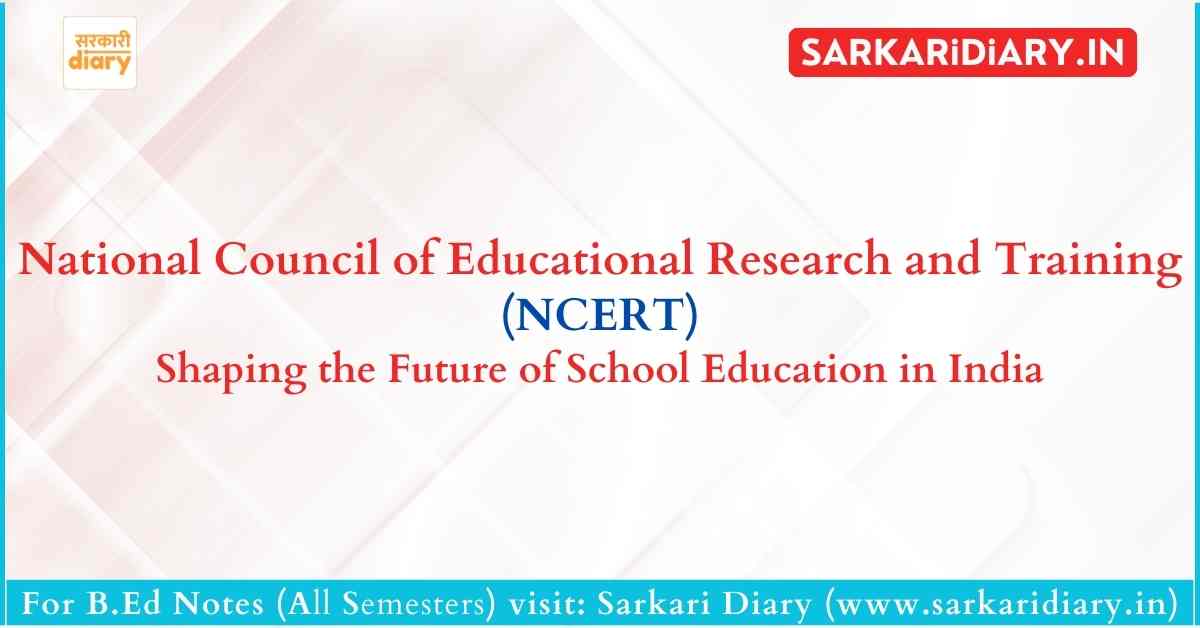National Council of Educational Research and Training (NCERT) stands as the national apex body for school education in India. Established in 1961, NCERT is an autonomous organisation functioning under the aegis of the Ministry of Education (formerly MHRD), Government of India. Its primary objective is to assist and advise the central and state governments on academic matters related to school education.

Governance and Structure
NCERT is fully funded by the Central Government and plays a crucial advisory role in the formulation and implementation of education policies. The governance structure ensures representation from various stakeholders across the education ecosystem.
Composition of NCERT Governing Body
| Position | Members |
|---|---|
| President | Union Minister of Education |
| Members | State/UT Education Ministers |
| Other Members | Chairman of UGC, Secretary of Education, and Four Regional Vice-Chancellors |
The organisation operates through its premier agency, the National Institute of Education (NIE), and its four Regional Colleges of Education (RCEs) located in Ajmer, Bhopal, Bhubaneswar, and Mysuru.
Key Functions of NCERT
NCERT plays a multifaceted role in promoting excellence in school education and teacher training.
Major Responsibilities of NCERT
| Function | Description |
|---|---|
| Educational Research | Conducts and promotes research on pressing issues in Indian education. |
| Pre-service and In-service Training | Organises training for teachers to enhance professional competencies. |
| Dissemination of Innovations | Shares latest practices and innovations in pedagogy and curriculum. |
| National Surveys | Undertakes surveys of national importance to aid policy planning. |
| Problem-focused Studies | Investigates critical challenges in Indian school education. |
| Curriculum and Textbook Development | Prepares textbooks and teaching aids for primary and secondary levels. |
| Promotion of Population Education | Through its dedicated Population Education Cell at NIE. |
Organisational Divisions of NIE (National Institute of Education)
The NIE, the academic wing of NCERT, comprises multiple departments to ensure focused expertise in different areas of education:
| Department | Area of Focus |
|---|---|
| Social Science and Humanities | Curriculum and pedagogy in social sciences |
| Science Education | Science curriculum, lab work, and experimental design |
| Educational Psychology and Foundations | Child development and learning theories |
| Teaching Aids | Development of educational tools and AV materials |
| Textbooks Development | Textbook creation and publishing |
| Primary and Elementary Education | Early childhood and primary level education |
| Teacher Education | Pre-service and in-service teacher training |
| Data Processing & Educational Survey Unit | Statistical and data-driven analysis in education |
| Library, Documentation, and Information Services | Educational resources, archives, and reference tools |
Regional Colleges of Education (RCEs)
Located in Ajmer, Bhopal, Bhubaneswar, and Mysuru, the RCEs provide:
- Specialised training for secondary school teachers
- Pre-service education programmes
- Workshops and field research for curriculum innovation
Recommendations by the Education Commission (1964–66)
The Kothari Commission (1964–66) made significant suggestions to strengthen the role and autonomy of NCERT:
- NCERT should function as the principal technical agency for improving school education.
- Governing body should reflect an All-India character, including:
- One outstanding secondary school teacher
- One primary education expert
- Appointment of a full-time Director and Joint Director
- Transfer of the Central Institute of Education to Delhi University
- Facilitate interchange of officials between NCERT and state departments
- Prioritise infrastructure development and expansion of NCERT campus
Notable Programmes and Initiatives
1. Textbook and Sourcebook Development
NCERT has developed some of the most widely used and critically acclaimed textbooks for primary and secondary education, aligned with the National Curriculum Framework (NCF).
2. Science Talent Research Programme
This initiative identifies and nurtures scientific aptitude among school students, aiming to cultivate future scientists and innovators.
3. Population Education Programme
Through its Population Education Cell, NCERT develops materials and training modules to integrate population education into the school curriculum.
ERIC – Promoting Educational Research
The Educational Research and Innovation Committee (ERIC) under NCERT is tasked with fostering research and innovation in school education and teacher training across the country.
ERIC’s Key Roles
- Provides grants for educational research
- Organises training for research scholars
- Encourages research in:
- Universalisation of Education
- Education for Weaker Sections
- Education for Social Change
Conclusion
The National Council of Educational Research and Training (NCERT) serves as the backbone of India’s school education system. With its wide mandate, NCERT influences every aspect of school education—from policy planning and curriculum development to teacher training and research.
As India continues to implement the National Education Policy (NEP) 2020, NCERT’s role becomes even more critical in ensuring that education remains inclusive, equitable, and excellence-driven.